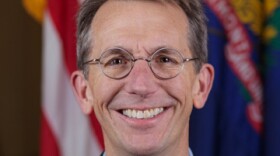Several advocacy groups are holding a series of debates with Vermont candidates focused on climate issues. The series kicked off with four official candidates for lieutenant governor.
The 90-minute virtual forum was put on by the Renewable Energy Vermont, Rights and Democracy, the Vermont Chapter of the Sierra Club, Vermont Conservation Voters and the Vermont Public Interest Research Group Research and Education Fund
The host said all qualified candidates were invited but only Democrats participated. Each candidate emphasized their Vermont roots and ties to the land.
Charlie Kimbell has been a member of the legislature’s rural caucus and during his six years in the Vermont House has focused on workforce development.
“I really think a practical solution to how we’re going to address some of our largest challenges and reducing our greenhouse gases is to have a workforce that’s prepared to do weatherization of our homes as well as extend broadband. Keeping rural Vermont actively involved in a growing sustained economy is one of the key issues of protecting our climate and our environment in the state of Vermont.”
Patricia Preston is the executive director of the Vermont Council on World Affairs and the only Democrat running who has not been elected to the statehouse. She said it’s crucial that state environmental policy creates a just and sustainable future for Vermonters.
"I will be an advocate for making child care and housing more affordable, expanding renewable energy production and strengthening our rural communities by expanding high speed internet access. While there are clear obstacles before us change is possible.”
Kitty Toll noted she served in the legislature for 12 years during which she pushed the state’s Global Warming Solutions Act through the Appropriations Committee. Asked how the state can diminish the climate crisis, Toll said it starts with educating children.
“So that children experience and understand what is happening to the environment but also understanding the good of renewable energy resources and small things that they can do within their own family. So our schools are going to be a critical piece in this as well as government leading the charge in doing the work that we need to.”
David Zuckerman is an organic farmer who served as lieutenant governor from 2017 to 2021, leaving the office to unsuccessfully run for governor. He countered that Vermont’s youth are well aware of the climate crisis.
“It’s our job to do the action to make the changes that need to happen. Also without dealing with economic injustice and inequities that are in our society people don’t have the resources to do the investments needed in their own lives around the environment. So we have to combine the reality of our climate justice issues with our economic injustice and social injustice issues. And if we don’t tie them together we’re not going to succeed.”
Topics the candidates were questioned about included the urgency of the climate crisis, how to address transportation emissions, accessibility to solar, bioenergy and wind power, and limiting access of fossil fuel lobbyists in Montpelier.
Each candidate responded to the questions and there were no rebuttals.
Republicans Joe Benning and Gregory Thayer are also running.






